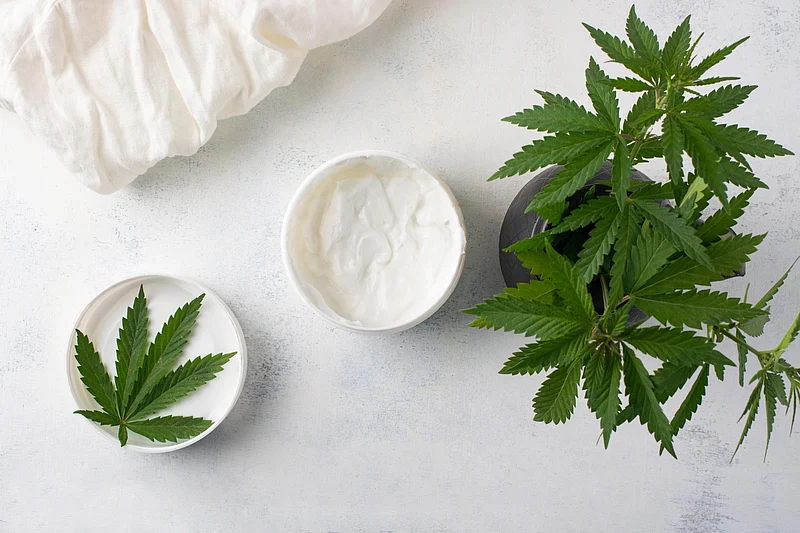Get Healthy!

- Posted July 26, 2022
What's in Your CBD Product? Labels Often Mislead
Customers buying creams, patches or lotions containing cannabidiol (CBD) to reduce pain or inflammation may get much more or much less than they expected.
Topical CBD products are gaining popularity in the United States, and the authors of a new study say the science hasn't kept up.
"Overall, this study and other studies before it just kind of speak to the need for improved regulatory oversight of cannabis products generally,"said researcher Tory Spindle, an assistant professor of psychiatry and behavioral sciences at the Johns Hopkins University School of Medicine, in Baltimore.
"The product innovation has far outpaced science and has far outpaced our ability to regulate them. I think we really need to kind of reel it back in," Spindle added.
CBD is a chemical in marijuana that doesn't create the high but is touted for various beneficial effects. CBD products took off in the United States after 2018, after federal legislation allowed hemp production on farms. While it's possible to extract CBD from hemp plants, the plants also contain some THC, the high-producing chemical in pot.
For this study, researchers from Johns Hopkins Medicine tested more than 105 topical CBD products, including lotions, creams and patches, sold online and in retail stores in Baltimore in the summer of 2020. The investigators found significant misleading and inaccurate labeling.
Some products declared they were free of THC when they actually contained it.
Only 89 products listed the total amount of CBD in milligrams on the label. About 18% of those contained less CBD than advertised and 58% contained more. Just 24% were accurately labeled, the researchers said.
"Really what it comes down to is just a quality control issue,"said Spindle, who is also a faculty member at the Johns Hopkins Cannabis Science Laboratory. "Without having some regulatory entity, like the [U.S. Food and Drug Administration], overseeing your operations, you don't necessarily have to be as rigid with your testing and your performance."
The research team detected THC in 37 of the 105 products. All contained amounts within the legal limit of 0.3%. Four of those that contained THC were labeled "THC-free."
"It was surprising to me that there was a decent amount of products that either said they were THC-free explicitly or that didn't say anything about THC being in the products that did have THC in there,"Spindle said. "That's definitely a concern."
Past studies have found mislabeled contents in oral or vapor CBD items for sale, Spindle added. And a study published online last month in Drug and Alcohol Dependence found about 60% of 80 CBD products tested contained THC.
It's not yet clear whether the presence of THC would cause a problem for someone who must undergo testing for their work or in the criminal justice system. But the research team is studying whether topical CBD products containing low levels of THC would result in a positive drug test.
The study also found that more than half of the products made therapeutic claims not approved by the FDA, including claims about alleviating pain and wrinkles.
"We don't really have any randomized controlled trials to say that if you use a topical CBD product, that's better than a placebo for treating pain. Those studies don't exist yet,"Spindle said.
Not much is known about the bioavailability and the absorption of these compounds through different routes, said Tiffany Weir, an associate professor and a graduate program director in the department of food science and human nutrition at Colorado State University. She was not involved in this study.
One of the least studied routes is the absorption from skin creams, Weir said.
"This stuff just stormed the market,"Weir said. "I feel like everything still needs to be done in terms of research. It made it to consumers long before the research has been able to catch up."
Weir said she applauds some companies in the industry that are sponsoring research to learn or confirm what the products do and which doses have an effect.
There are cannabinoid receptors in human intestines, so "there's probably going to be some impacts on intestinal health and on the gut microbiota,"she noted.
Daniele Piomelli is director of the University of California, Irvine Center for the Study of Cannabis. He said he is less concerned about the amount of CBD in products varying from what the labels indicate and more concerned about the chemicals used to extract the compound.
"You need to use solvents. Residues of those solvents could be there in the CBD product. If there is no solid control over that, that in the long run can be problematic or even in the short run,"said Piomelli, who had no role in the research.
The study findings were published online July 20 in JAMA Network Open.
More information
The U.S. National Center for Complementary and Integrative Health has more on cannabis and cannabinoids.
SOURCES: Tory Spindle, PhD, assistant professor, psychiatry and behavioral sciences, Johns Hopkins Medicine, Baltimore, Md.; Tiffany Weir, PhD, associate professor and graduate program director, department of food science and human nutrition, Colorado State University, Fort Collins, Colo.; Daniele Piomelli, PhD, PharmD, director, University of California, Irvine Center for the Study of Cannabis, Irvine, Calif.; JAMA Network Open, July 20, 2022, online







